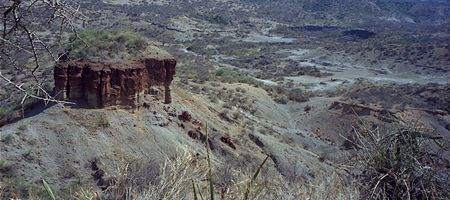Erratic changes in the East African climate around two million years ago may have been the driving force behind human evolution, say researchers at Penn State and Rutgers University.

Scientists have long been aware that, around this time, the environment gradually dried out, in a process that took up to three million years. But, says the team, this wasn’t a steady process: instead, the environment was highly variable.
“The landscape early humans were inhabiting transitioned rapidly back and forth between a closed woodland and an open grassland about five to six times during a period of 200,000 years,” says Clayton Magill, graduate student in geosciences at Penn State. “These changes happened very abruptly, with each transition occurring over hundreds to just a few thousand years.”
It’s precisely this type of variability, many anthropologists believe, that can trigger cognitive development – and this period coincides with the the establishment of the genus Homo and the first evidence of tool use.
“Early humans went from having trees available to having only grasses available in just 10 to 100 generations, and their diets would have had to change in response,” says Magill.
“Changes in food availability, food type, or the way you get food can trigger evolutionary mechanisms to deal with those changes. The result can be increased brain size and cognition, changes in locomotion and even social changes – how you interact with others in a group.”
The researchers examined lake sediments from Olduvai Gorge in northern Tanzania, looking particularly at biomarkers – fossil molecules from ancient organisms – from the waxy coating on plant leaves.
Using gas chromatography and mass spectrometry allowed them to determine the relative abundances of different leaf waxes and the abundance of carbon isotopes for different leaf waxes, reconstructingthe types of vegetation present in the Olduvai Gorge area at very specific time intervals.
The results showed that the environment transitioned rapidly back and forth between a closed woodland and an open grassland, perhaps because of changes in the Earth’s movement and changes in sea-surface temperatures.
“The research points to the importance of water in an arid landscape like Africa,” said Magill. “The plants are so intimately tied to the water that if you have water shortages, they usually lead to food insecurity.
“Together, these two papers shine light on human evolution because we now have an adaptive perspective. We understand, at least to a first approximation, what kinds of conditions were prevalent in that area and we show that changes in food and water were linked to major evolutionary changes.”






